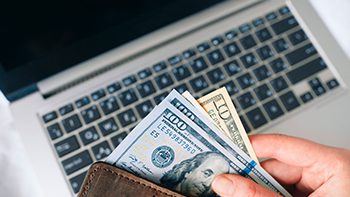
What is unclaimed money?
Essentially, unclaimed money is money that may have been owed to you at some point, but was no longer deliverable. If you changed your bank, home address or contact information, it is possible that a payment or refund may never have reached you, thus becoming unclaimed. Money that is not payable is than held by the United States government until it is claimed. It is worth knowing that you will only be able to claim funds if you are the individual that the money is owed to, and you will be expected to prove that. While there are a variety of different reasons that you may have unclaimed money, it is important to search for these potential funds. You may be surprised at what you find. It is also worth knowing that name changes will affect your unclaimed money searches. If you have changed your name, be sure to search your current name and all previous names in order to uncover any unclaimed money that may still be owed to you.Search for Unclaimed Money in Each State You Have Lived Within
It is recommended that you search for unclaimed property and money within each state that you have lived in. As mentioned previously, you should also search states by the legal name that you held at the time. You can check for unclaimed money by looking at each state or by conducting a multi-state search. If all else fails, contact your state’s unclaimed property office for further assistance with your claim.Check for Unclaimed Money With Previous Banks and Credit Unions
If you have ever switched bank accounts, you should review each old bank account to ensure that you do not have unclaimed funds that are owed to you. Even if you cleaned out a bank account before closing it down, it is possible that funds could have been deposited into that old account due to utility deposits, insurance premium refunds, wages owed from former employers and rental deposit refunds. You can contact each bank directly, or there are a variety of websites that allow you to search for this form of unclaimed money. If the financial institution has since closed, you can search the FDIC database or the National Credit Union Administration (NCUA) for missing funds.Search the IRS for Unclaimed Money
While the Internal Revenue Services (IRS) may find a way to contact you if you owe any federal or state taxes, they may not be as diligent to reach you if you have unclaimed federal and state tax refunds. Unclaimed tax refunds generally occur due to name changes or a change of address. If your refund was undelivered for any reason, you are still entitled to that money. While there are websites that will aid you in your search for unclaimed tax related money, you can also review whether or not the government or state owes you money by contacting the IRS.Look for Unclaimed Retirement Benefits and Former Pensions
It is worth looking for unclaimed retirement benefits or pension amounts if you have had previous employers that offered these benefits. If you had switched jobs from a previous employer that did offer a retirement plan, there is a chance that you had left a balance when you changed employers. Even if that balance had been small, occasionally the balance will grow overtime, making it well worth the effort of tracking down unclaimed retirement benefits. If you had previously worked for an employer that offered pension plans, you may have a balance with the Pension Benefit Guaranty Corporation (PBGC) as this corporation insures the benefits of pensions.Unpaid Life Insurance Payouts
There are a number of reasons that life insurance payouts become unclaimed. In many cases, if a life insurance policy that you owned was demutualized, the insurer may owe you unclaimed money or stock. Additionally, if a relative passed away that held a life insurance possibility, there is a chance that you may have unclaimed life insurance benefits available from that policy.FHA-Insurance Refunds
If you had a FHA-insured mortgage on your home, you could be eligible for a refund through the United States Department of Housing and Urban Development (HUD). You can find out if you have any unclaimed money related to FHA mortgages by visiting the HUD website.Proving Your Claim for Unclaimed Money
If your search for unclaimed money proves fruitful and you do find unclaimed money, you will need to submit a claim request. In most cases, you will be required to provide your proof of identity and, in some cases that you lived at the address that is associated with the funds. Your identity can be proven by providing a copy of your Social Security card and a qualifying photo ID such as a state driver’s license or state identification card. Proof of address can be provided by bank statements, former policies and former utility or cable bills. In the event of a name change, you may be required to provide proof of your legal name change. Unclaimed money can be a pleasant and welcome surprise, as it allows you to spend money on something extra without having to worry about your personal or household budget.By Admin –